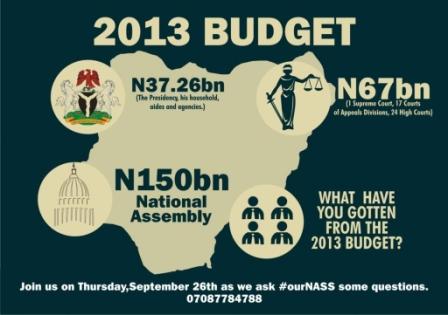On September 27, 2013, hundreds of Nigerian youths took to the streets, or rather to the chambers of the National Assembly to air their grievances about the bloated income and allowances of their lawmakers.
#OurNASS (Our National Assembly) was an initiative of Nigerian civil society group Enough is Enough and some Nigerian netizens. They demanded for more financial openness from an opaque legislature:
DEMAND
- Immediate comprehensive breakdown of their budgetary allocation of N150 billion for 2013.
- An account of the N1 trillion received since 2005 before the next recess in December.
- Functional contact information – numbers, email addresses and physical addresses of their constituency offices.
- ALL voting records on ALL constitutional amendments.
- We demand that the attendance list for each plenary be made public.
Determining the exact figure that the legislator earns, like most issues that require accurate data in Nigeria, is almost “mission impossible”. However, Nigerian blogger and public commentator Akin Akintayo offers insight:
Getting round the inscrutability of the remuneration for Nigerian legislators has been a completely fraught exercise that none of the organisations with the function of regulating such appear to have a handle on.However, when the Economist blew the lid off the exorbitant salary packages of the Nigerian Senators a few weeks ago as I wrote in this blog, the uproar that followed especially on social media meant that it was impossible to ignore and something had to be done.
What did the Economist reveal? Writing in Nigeria Village Square, Femi Ajayi explains:
The Economist magazine revealed that Nigeria federal legislators, with a basic salary of $189,500.00 per annum (N30.6m), are the highest paid lawmakers in the world. It looked at the lawmakers’ basic salary as a ratio of the Gross Domestic Product per person across the world. According to the report, the basic salary (which excludes despicable allowances); of a Nigerian lawmaker is 116 times the country's GDP per person of $1,600.00.
In another report, the 469 federal lawmakers (109 senators and 360 members of the House of Representatives) cost Nigeria over N76 billion on annual salaries, allowances and quarterly payments. Each member of the 54 standing Senate committee, receives a monthly imprest of between N648 million and N972 million per year, while, a member of the HOR receives N35 million or N140 million as quarterly or yearly allowances; which means conservatively the 25 per cent of the overhead of the nation's budget goes to the NASS.
[…] one will understand the reason why the National Assembly members were asking for the head of Lamido Sanusi Lamido, the Central Bank governor, who once said that the Federal lawmakers take about 50 per cent of our National Budget. If you juxtapose the above figures with our current budget, you will see clearly that the National Assembly members are the albatross of Nigeria; because they legislate on, and appropriate public funds to themselves, thereby looting the masses blind.
How on earth can anybody justify 300 mil/annum in salaries for 360 pple at the expense of 120 mil pple in poverty? How?? #OurNASS
— Kolawole Osafehinti (@kolaosafehinti) September 22, 2013
Royal Amebo (@RoyalAmebo) pointed out:
Quarterly allowance of each member of d House of Representatives was increased to N27 million in March 2012. are we still watching #OurNASS
— Ask#OurNASS•26/09/13 (@RoyalAmebo) September 21, 2013
Nnamdi Anekwe-Chive (@nnamdianekwe), a security specialist, wanted to know what he achievements of Members of Parliament:
All the members of the National Assembly are collective failure. What have they achieved since 1999 other than sharing trillions? #OurNASS
— Nnamdi Anekwe-Chive (@nnamdianekwe) September 18, 2013
Zainab Usman (@MssZeeUsman), a writer and blogger, wrote:
Young Nigerians demand for transparency & accountability from the National Assembly #ournass pic.twitter.com/8egSN9buUH
— Zainab Usman (@MssZeeUsman) September 26, 2013
Emerie Udechukwu (@emerieconqueror) shared a link to a video of the protest:
Senators issued outdated pay slip to #ournass protesters. http://t.co/dpKkdnUCIK
— Emerie Uduchukwu (@emerieconqueror) September 27, 2013
The protest was endorsed by Nuhu Ribadu(@NuhuRibadu), Nigeria's former anti-corruption chief:
Yes, we need transparency and accountability in all sectors. I support full disclosure #OurNASS
— Nuhu Ribadu (@NuhuRibadu) September 26, 2013







